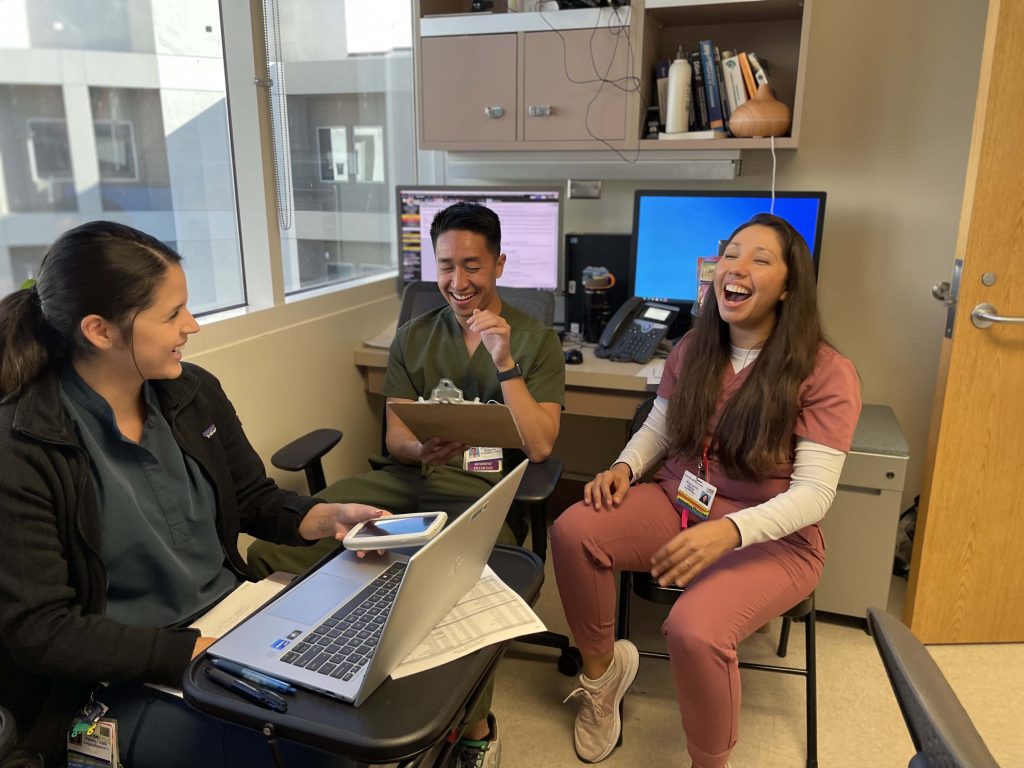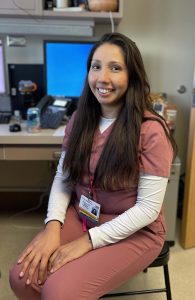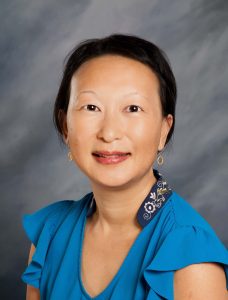Finding Joy Through Connections: A Psychiatrist’s Journey to a Meaningful Practice
by Grace W. OEI ’04
"The joy of medicine is sharing it with others.”
— Renee Michelle Garcia ’10 Tweet

T
he first thing you may notice about Renee Michelle Garcia ’10 is her smile. It is a wide smile that radiates joy. If you run into Garcia at Riverside University Health System Medica

l Center (RUHS-MC), where she practices as a psychiatrist, her smile invites you into a collaborative space of thoughtful patient care. Garcia is the head of the psychiatry consultation liaison service at RUHS-MC. Consultation/liaison (CL) is a subspecialty of psychiatry, and CL psychiatrists focus on caring for patients with coexisting medical and mental health diagnoses.
Garcia describes her role as an expert in psychiatric illness and a specialist in supporting her non-psychiatry colleagues to optimize the patient’s medical care. She points out, “[When] teams are making decisions in parallel rather than collaboratively, the patient is the one who struggles. They may get mixed messages and manifest their feelings as anxiety, insomnia, anger, and refusal of care because they don’t understand what the plan is.” Garcia continues, “The liaison piece is bringing people together. How can we bring physicians to a point where they can communicate better with the patient?” In an environment where practicing medicine can seem reductive, Garcia’s open approach to caring for complex patients brings joy and profound relief to her colleagues.
Garcia did not always want to be a psychiatrist. When she started medical school, she thought that she would pursue pediatrics. During her third year of medical school, she did a CL rotation and fell in love with it. CL psychiatry also felt personally significant to her. Garcia explains, “In psychiatry, we all joke that everybody has their reason to be in psychiatry. There’s some type of personal connection.” She chuckles wryly, “For myself, my father passed away when I was 20. He developed congestive heart failure, and he passed away when he was 47. He definitely dealt with some depression while he was struggling with congestive heart failure (CHF). I could see the changes in his behavior with the depression and all the things that happen with depressed patients when they’re ill—they don’t always follow up, they don’t always remain compliant with all the recommendations, etc. We know depression, specifically in CHF, increases all-cause mortality. My father passed away. What he needed was treatment for that depression in conjunction with his medical illnesses.”
After her CL rotation, Garcia changed her plans to specialize in psychiatry. She finished her residency at the University of Southern California-Los Angeles County (USC-LAC). Then, she went to Stanford University for her CL fellowship, where she developed a deeper appreciation and understanding of how medical illnesses impact psychiatric illnesses and vice versa. At Stanford, Garcia evaluated and followed transplant patients with psychiatric diagnoses in her clinic. She also ran a psycho-oncology clinic embedded in the cancer center. These experiences helped her understand the importance of culture in her patients’ conception of disease and medical decision-making. Garcia was invited to write a chapter in a psychiatry textbook on this subject and is now revising her work for the second edition of the textbook. “It’s about recognizing the whole person and the pieces that help patients balance their lives and manage their stress. Learning about and respecting other people’s cultures connects you with your patient and your patients with others,” Garcia said.
Garcia credits her time at Loma Linda University School of Medicine (LLUSM) as crucial. “I feel like a lot of the exposure I had to culture happened when I was at LLUSM. We had a lot of readings in medical school focused on culture and how it related to people’s understanding of what was happening with their health and their bodies.” Garcia brings the discussion back to her specialty. “One of the special components of CL is the liaison piece—the connection. I feel it is an extension of Whole Person Care. Loma Linda really laid the foundation for how I function and practice professionally.” Garcia’s smile becomes even wider, “Do you see how when you’re in an environment where connection is the focus, how it can create so much joy?”
Garcia shares her practice of collaborative patient care with her colleagues and with the residents and students who rotate with her. She finds tremendous joy in teaching. In fact, Garcia now knows that education is an indispensable part of her calling in medicine. After fellowship, she remained on staff at Stanford University and transitioned into practice at a large community hospital in Orange County. While she appreciated the experience, she felt that something was missing. A colleague invited her to consider returning to academic medicine at RUHS-MC. Since starting in January 2024, she says, the joy and fulfillment of medicine are back. “It’s sharing with the residents, seeing the joy when they see their patients get better, seeing how they make those connections, those ‘aha’ moments.” Garcia pauses and finishes, “And to be able to see that and know that the education I’m providing will go on, and it will positively impact patient care in the future, even if it’s not in my own hands. What has consistently come back to me is that the joy in medicine is sharing it with others.”
Garcia’s journey is a testament to the importance of connecting in medicine. It is the foundation for her collaborative approach to patient care and teaching. As she continues to shape the future of psychiatry at RUHS-MC, she does so with the understanding that medicine is not just about individual achievement but about the collective effort of a community committed to holistic healing. It is the essence of compassionate and joyful medicine.

Grace W. Oei ’04 is a pediatric intensivist, clinical ethicist, and director of the Center for Christian Bioethics at LLUH.
Published in the Fall/Winter 2024 ALUMNI JOURNAL.


